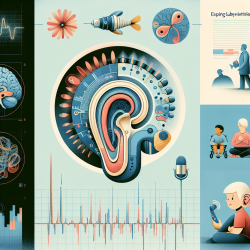Understanding Dementia: Insights for Practitioners
In the ever-evolving field of dementia care, staying informed about the latest research and consensus is crucial for practitioners. The study titled "What should we know about dementia in the 21st Century? A Delphi consensus study" offers valuable insights into essential knowledge that can enhance care delivery and education programs. This blog explores the key findings of the study and their implications for practitioners in the field of speech-language pathology and beyond.
Key Findings from the Delphi Consensus Study
The Delphi study conducted by Annear et al. (2015) aimed to reach a consensus among dementia experts from English-speaking countries on essential and contemporary knowledge about dementia. Through three rounds of data collection, the study identified 36 statements that experts considered crucial for understanding dementia. These statements spanned various domains, including care for individuals with dementia, dementia characteristics, symptoms and progression, diagnosis and assessment, and treatment and prevention.
Implications for Practitioners
For practitioners, these findings offer a roadmap to enhance their understanding and approach to dementia care. Here are some key takeaways:
- Comprehensive Care: The study emphasizes the importance of a holistic approach to dementia care, considering both the individual with dementia and their caregivers. Practitioners should focus on person-centered strategies that support independence, communication, and meaningful engagement.
- Diagnosis and Assessment: Early and accurate diagnosis is crucial for improving treatment outcomes. Practitioners should be vigilant in identifying co-existing medical and psychiatric conditions, such as depression and delirium, which can impact the quality of life for individuals with dementia.
- Non-Pharmacological Interventions: The study highlights the effectiveness of psychosocial interventions in improving the quality of life for people with dementia. Practitioners should prioritize non-pharmacological approaches to address behavioral and psychological symptoms, ensuring a balanced and individualized care plan.
- Education and Support: Educating both individuals with dementia and their caregivers is essential for managing the condition effectively. Practitioners should advocate for educational programs that enhance understanding and provide support to caregivers, reducing stress and improving care outcomes.
Encouraging Further Research
While the Delphi study provides a foundation of essential knowledge, it also underscores the need for ongoing research and education in the field of dementia care. Practitioners are encouraged to delve deeper into the study's findings and explore additional research to stay abreast of emerging trends and evidence-based practices.
To read the original research paper, please follow this link: What should we know about dementia in the 21st Century? A Delphi consensus study.










